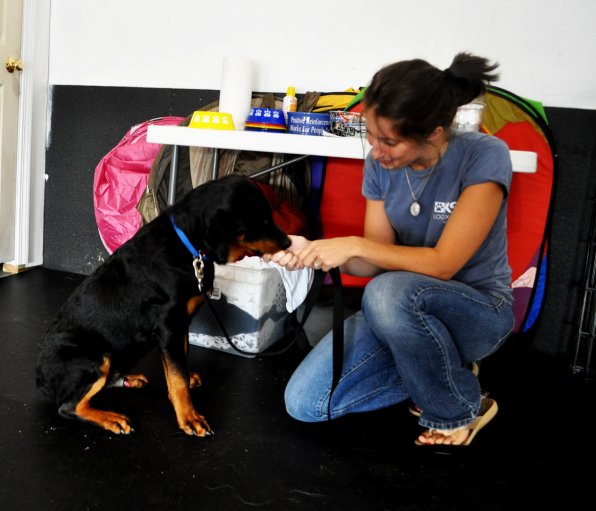Name: Helen Nicholls
Owner, No Monkey Business Dog Training.
Nichols will be making a presentation as part of the SPCA's Walk for the Animals on Sept. 16.
How long have you been a dog trainer? How did you get started in the field?
I started over eight years ago professionally. But it really started in high school. I painted pet portraits for extra money, and so to get the dogs to sit and stay still, I had to teach them to stay. So, I went to library and got all these books on dog training and read them, and by the time I left the person's house where the portrait was done, the dog was behaving better, too.
But I never really tapped into it until I went to college. While I was in college – I have a degree in fine arts – I decided I needed to work through school, so I worked at vet clinics and doggie daycares, and I just started becoming really interested in behavior, and it just sort of snowballed from there. Once I graduated college, I kind of dropped the paint brush and picked up a treat pouch and ran into working with dogs.
How many dogs do you have? Tell us about them.
I have three dogs: I have two Papillons, which are basically glorified cats, and then I have a German shepherd. And I also have a parrot.
There are many different schools of thought regarding dog training. What's yours?
Basically, I think every dog is different. I don't train any dog exactly the same as I did the one before. My main methodology is I use what I call a least-intrusive, minimally aversive (approach). So I like to use reward-based training. Make them want to do it. I go to work to get paid, right? I really want to encourage dog owners and dogs to have a relationship based on mutual trust and respect. and that can be done without the use of force or methods that cause fear.
Have you trained other kinds of animals?
Yes, I've worked with birds and horses, bunny rabbits. All kinds of species. Bunnies like bananas, and they like the clicker. I think that's a huge teaching tool is working with other species, because I think just because we can throw a collar and a leash on our dogs and jerk them around doesn't mean we should. By working with other species, we learn a lot about ourselves. Training is really a two-part process.
Do your training techniques work on people?
Yes, absolutely. It works for husbands, it works for kids. I have a 2-year-old and I have a husband, and they're both pretty good. Reward-based training covers everybody. If you show up early to work and you get a $50 gift card to Starbucks, you are going to be a lot more motivated to show up early than if you show up a minute late and get told you might get fired.
What parts of your personality make you a good dog trainer?
I like working with people. Dog training has really very little to do with dogs. I know that sounds odd, but you are training people, and you have to have a lot of patience and be able to break down sometimes very complicated scientific work into easily understood terms. That's where I think I have had success. I'm able to take something that people may not understand and break it down into a simple pattern or a simple step-by-step, and that's where we see the animal and the people be successful. And of course I love dogs – that helps!
What are some common mistakes people make in training or disciplining their dog at home?
One that I see a lot of is they label their dog. Labeling a dog is a big mistake. People label a dog as dominant, as stubborn, as aggressive, and when you do that you take away from actually looking at the behaviors the dog is displaying. When we label anything, we automatically narrow our views. And that can really hinder the process of behavior modification. And there's also the very common myth that all dogs are dominant and they wake up every day trying to rule the roost. That has been shown to not be the case, that they really do need some leadership.
Do you discipline a dog? And if so, when do you discipline and when do you reward and why?
There needs to be consequences. I prefer consequences over discipline. You have to say no sometimes. You can't modify behavior without some consequences. But the way I use them really depends upon what the dog has done, what level of consequence is suitable. My biggest thing is I like to teach a dog alternative behavior so he can be successful, and that way I really don't need to punish or use consequences, because he's making better choices.
Do you consider yourself a Dog Whisperer?
No! People call me that and I'm like, “I'm not the Dog Whisperer!” I am just like a therapist, for both people and for dogs. I just help people understand their dog and learn how to communicate better with them. I certainly don't do any whispering to any dogs.
Hidden talent?
Art. I paint. I do a lot of dog portraits. And design. I designed my own website.
Guilty pleasure?
Chocolate. Chocolate is my positive reinforcement. At the end of a long day, I eat my chocolate.









